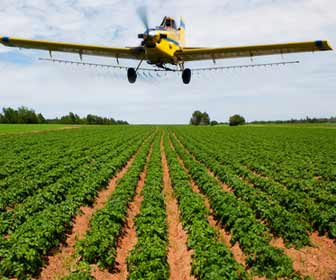Crop Dusting Jobs
Imagine that you have hundreds of acres of farmland where you grow wheat, corn, or other crops. How are you going to fertilize them and protect them from pests? It might be a good idea to hire a crop duster.
Crop dusters, also known as agricultural pilots or ag pilots, are pilots who fly small planes at low altitudes to spray fertilizers, fungicides, and pesticides on fields of crops via aerial application. Nearly 25,000 people work in this industry at 3,000 operations using 9,000 aircraft that cover 180,000,000 acres of farmland. It’s big business and it’s sometimes dangerous.

Also See: Farming Jobs, Airline Jobs
Crop dusting is an efficient and economical way to keep farmland productive. Without a crop duster, it would take countless man-hours to spray acres of potatoes, mint, barley, wheat, tobacco, grapes, apples, and oranges. Despite the environmental concerns of aerial applications of chemicals, crop dusters can spray huge areas efficiently and effectively.
Crop dusters fly in small planes that cost anywhere from $100,000 to $900,000. These planes are outfitted with special containers and dispersal systems that carry 100’s of gallons of liquid chemicals. The crop duster flies at very low altitudes, sometimes only 10 or 20 feet off the ground, to ensure that the hazardous chemicals effectively reach the intended crops. The crop duster has to watch out for fences, telephone poles, power lines, trees, and other hazards that high-flying pilots easily avoid.
The first step to become a crop duster is to earn a commercial pilot license through the Federal Aviation Administration. This includes passing a medical exam and flying for 250 hours. Next attend agricultural pilot training. There are several ag pilot programs in the United States where pilots learn about crops, entomology, chemicals, and crop dusting. After training apply for an agricultural pilot license. It is a good idea to apprentice with a veteran crop duster to learn the trade. Eventually you’ll be on your own cruising over the crops.
Most crop dusters work at rural airports near vast expanses of farmland. Their work begins early in the morning mixing chemicals and pumping them into the planes. Next the pilot is responsible for surveying the area for any hazards that might be a problem for low altitude flying. He also must notify all neighbors and local residents about the crop dusting to ensure they can take any necessary precautions to protect themselves from the toxic chemicals that will be in the air.
Crop dusting provides regular work during the growing season, which is longer in the warmer, southern states. Crop dusters fly over our nation’s crops dousing them with chemicals in the early morning and in the early evening, when the air is calm. Most crop dusters follow the crops and the seasons to stay employed. Others spend the non-growing season dousing wildfires for fire fighting crews, surveying land, flying banners over sporting events, or working as flight instructors.
Crop dusting is a booming flying niche. Many of the current crop dusters are old timers that are nearing retirement. This leaves a huge opportunity for a new generation of crop dusters to take over one of flyings most dangerous professions. To be a successful crop duster, it takes time. Most crop dusters start out earning about $20,000 per year, but the established and experienced crop dusters can make up to $100,000 per year by following the crops and retaining loyal clientele.
If you’ve always been intrigued by flying and think you have what it takes to fly low with hazardous cargo, then look into a career in the farming industry as a crop duster. Just be sure you don’t have to work on May 27. That’s International Crop Duster’s Day.
Quick Facts About Aerial Applicator Employment
Job Title: Crop Duster, Aerial Applicator, Agricultural Pilot
Office: In a plane over farmland
Description: Fly small planes and spray fertilizer and pesticides over crops
Certifications/Education: Commercial and Agricultural Pilot License
Necessary Skills: Flying experience
Potential Employers: Independent Contractor
Pay: Start at $20,000 per year, but with experience can make up to $100,000 per year
Helpful Crop Duster Employment Links:
Search Agricultural Pilot and Other Pilot Jobs on JobMonkey
Federal Aviation Administration
National Agricultural Aviation Association
Agricultural Aviation’s Newspaper


 Teach English in Asia
Teach English in Asia  Cruise Ship Jobs
Cruise Ship Jobs  Alaska Fishing Industry Jobs
Alaska Fishing Industry Jobs  Sharing Economy / Gig Economy
Sharing Economy / Gig Economy